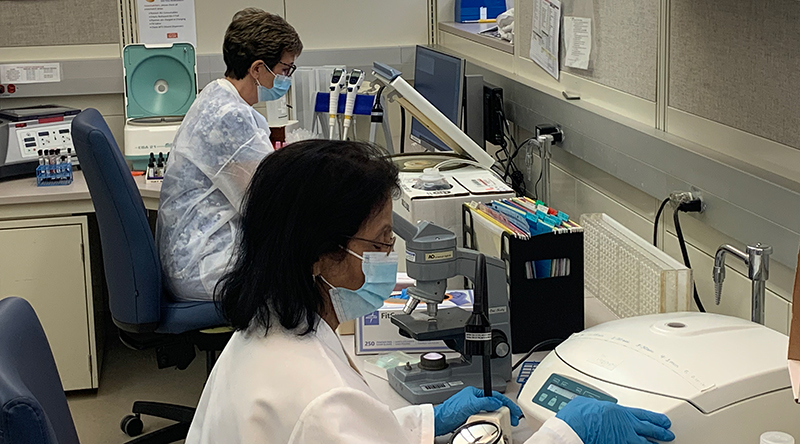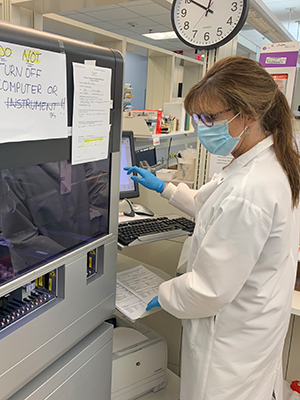-
Services
Featured Specialties
-
Locations
Location Type
-
Patients & Visitors

Medical technologists in YNHH’s Blood Bank, including Anne Baker, left and Meena Shah, are part of ongoing efforts to optimize the use of blood and ensure the hospital always has sufficient supplies. These efforts have become even more important during the current, statewide blood shortage crisis.
During her seven years battling acute monoblastic leukemia, Nicole Donzello has received 155 units of blood products, including blood and platelets.
At a Jan. 26 press conference, the Smilow Cancer Hospital patient thanked blood donors. Without them, “I would not be here today speaking to all of you and having the opportunity to spend all these years I have with my family, my children, my husband, my parents,” she said.
The American Red Cross Connecticut and Rhode Island region held the press conference at Yale New Haven Hospital to encourage people to give blood during what has become a regional and national crisis. Likely exacerbated by the ongoing COVID-19 pandemic and winter season, a shortage of donors has left supplies of blood and blood products at “dangerously low levels,” Richard Branigan, Red Cross chief operating officer, said at the press conference.
“To put it into perspective … we’re comfortable when we have a five-day supply of blood. We don’t have that comfort level right now,” he said. “We’re looking at one- to two-day supplies of blood sometimes. That is alarming.”

Also speaking at the press conference were Connecticut Gov. Ned Lamont, Lt. Gov. Susan Bysiewicz, Yale New Haven Health CEO Marna Borgstrom and Chief Clinical Officer Thomas Balcezak, MD.
Dr. Balcezak noted that every day, Yale New Haven Hospital uses 80 to100 units of red blood cells, along with platelets and other blood products, to treat patients with a wide variety of health conditions and during emergencies. He praised Yale New Haven physicians and Blood Bank staff for being good stewards of what has always been a precious resource.
Yale New Haven has a number of protocols and procedures in place to ensure blood is not wasted, and that hospitals always have enough on hand for emergencies and other procedures requiring large quantities of blood, said Christopher Tormey, MD, director, Transfusion Medicine Service, Laboratory Medicine.
While it’s rare for YNHHS hospitals to postpone certain procedures, Blood Bank physicians and other physicians and surgeons will discuss certain patient cases ahead of time to ensure there is enough blood to perform a procedure while maintaining a supply.
The Blood Bank also uses a “split” protocol for some patients. If a physician requests two units of blood, for example, the Blood Bank will send one unit. Patients are evaluated after receiving that one unit to see if it achieved the treatment goal.
About 75 percent of the blood the hospital uses is for patients with cancer and certain hematologic disorders that require transfusions.
“We can’t plan for or postpone these transfusions,” Dr. Tormey said.
After researching best practices, YNHHS altered some of its protocols – including changing the threshold at which a transfusion is required for certain patients – to optimize blood use.
Other blood conservation measures include using a “cell saver” device that collects the blood a patient normally loses during surgery, rinses away non-blood elements, then separates out the red cells, which are returned to the patient if they need it.
These and other steps have helped ensure YNHHS has a sufficient blood supply, even during the current crisis. But blood is still needed – particularly type O positive – the most common blood type -- and O negative blood, which can be given to patients with any blood type.
All of the press conference speakers stressed that giving blood is easy, and takes no more than an hour. The Red Cross follows strict safety protocols, including masking and social distancing, to protect donors.
“One thing I learned when I was diagnosed with cancer is that I had to relinquish control. I had no control over my diagnosis; I had no control over how my body would react to the treatment,” Donzello said. “But what I do have control over—and which is why I am here—is to encourage everyone out there to please, please donate blood. It is a simple, simple process that will take you only an hour of your time, and you will be literally saving a life.”
The American Red Cross holds blood drives throughout Connecticut and the region. To make an appointment, visit redcrossblood.org.